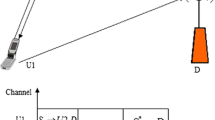Abstract
In this paper, we present aperformance analysis of a wireless multimedia direct-sequence code-divisionmultiple-access(DS/CDMA) system based on different error control schemes and an optimal power control algorithm over multipath Rayleigh fading channels.The error control schemes consist of Forward Error Correction (FEC), diversity, and Automatic Repeat reQuest (ARQ). The concatenated codes with a Reed–Solomon outer code andconvolutional inner code are used as FEC. Since a multimedia system is required to support services with different rates and Quality of Services (QoS), different error control schemes are used to satisfy the requirements of different media. In particular, a power control algorithm which can optimize the capacityperformance of the integrated system is presented. Numerical results will show that power optimization can increase the capacity and decrease the total transmission power. By incorporating diversity and hybrid ARQ along with appropriate code ratesin the optimal power controlled system, dramatic increase in system capacitycan also be achieved.
Similar content being viewed by others
References
A.M. Viterbi and A.J. Viterbi, “Erlang Capacity of a Power Controlled CDMA System”, IEEE J. Select. Areas Commun., Vol. 11, No. 6, pp. 892–900, 1993.
S. Yau and E. Geraniotis, “Optimal Power Control Law for Multi-Media Multi-Rate CDMA Systems”, in IEEE Vehicular Technology Conference, VTC'96, Atlanta, GA, U.S.A., April 1996, pp. 392–396.
J. Wu and R. Kohno, “A Wireless Multimedia CDMA System Based on Transmission Power Control”, IEEE J. Select. Areas Commun. Vol. 14, No. 4, pp. 683–691, 1996.
A. Sampath, P. Sarath Kumar and J.M. Holtzman, “Power Control and Resource Management for a Multimedia CDMA Wireless System”, in Proc. 6th Intern. Symp. Personal, Indoor and Mobile Radio Communications, PIMRC'98, Toronto, Ontario, Canada, September 1995, pp. 21–25.
K.B. Letaief, K. Muhammad and J.S. Sadowsky, “Fast Simulation of DS/CDMA with and without Coding in Multipath Fading Channels”, IEEE J. Select. Areas Commun., Vol. 15, No. 5, pp. 626–639, May 1997.
Y.F. Melanie Wong and K.B. Letaief, “Concatenated Coding for DS/CDMA Transmission in Wireless Communications”, IEEE Transactions on Communications, Vol. 48, No. 12, pp. 1965–1969, 2000.
J.G. Proakis, Digital Communications 4th edn, McGraw-Hill: New York, 2000.
S.B. Wicker, “High-Reliability Data Transfer over the Land Mobile Radio Channel Using Interleaved Hybrid-ARQ Error Control”, IEEE Transactions on Vehicular Technology, Vol. 39, No. 1, pp. 48–55, 1990.
J.M. Holtzman, “A Simple, Accurate Method to Calculate Spread-Spectrum Multiple-Access Error Probabilities”, IEEE Trans. Communications, Vol. 40, No. 3, pp. 461–464, 1992.
K.B. Letaief, “Efficient Evaluation of the Error Probabilities of Spread-Spectrum Multiple-Access Communications”, IEEE Trans. Communications, Vol. 45, No. 2, pp. 239–246, 1997.
S.B. Wicker, Error Control Systems for Digital Communication and Storage, Prentice-Hall: New Jersey, 1995.
Author information
Authors and Affiliations
Rights and permissions
About this article
Cite this article
Letaief, K., Melanie, Y. Performance Analysis of Wireless Multimedia DS/CDMA Communications with Power Control and Hybrid ARQ. Wireless Personal Communications 20, 205–218 (2002). https://doi.org/10.1023/A:1014475309822
Issue Date:
DOI: https://doi.org/10.1023/A:1014475309822




